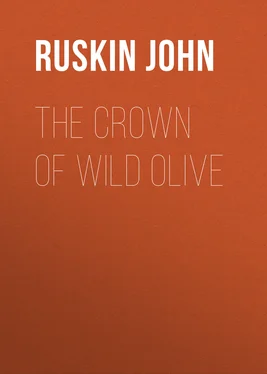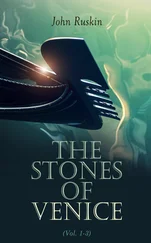John Ruskin - The Crown of Wild Olive
Здесь есть возможность читать онлайн «John Ruskin - The Crown of Wild Olive» — ознакомительный отрывок электронной книги совершенно бесплатно, а после прочтения отрывка купить полную версию. В некоторых случаях можно слушать аудио, скачать через торрент в формате fb2 и присутствует краткое содержание. Жанр: foreign_antique, foreign_home, literature_19, visual_arts, на английском языке. Описание произведения, (предисловие) а так же отзывы посетителей доступны на портале библиотеки ЛибКат.
- Название:The Crown of Wild Olive
- Автор:
- Жанр:
- Год:неизвестен
- ISBN:нет данных
- Рейтинг книги:4 / 5. Голосов: 1
-
Избранное:Добавить в избранное
- Отзывы:
-
Ваша оценка:
- 80
- 1
- 2
- 3
- 4
- 5
The Crown of Wild Olive: краткое содержание, описание и аннотация
Предлагаем к чтению аннотацию, описание, краткое содержание или предисловие (зависит от того, что написал сам автор книги «The Crown of Wild Olive»). Если вы не нашли необходимую информацию о книге — напишите в комментариях, мы постараемся отыскать её.
The Crown of Wild Olive — читать онлайн ознакомительный отрывок
Ниже представлен текст книги, разбитый по страницам. Система сохранения места последней прочитанной страницы, позволяет с удобством читать онлайн бесплатно книгу «The Crown of Wild Olive», без необходимости каждый раз заново искать на чём Вы остановились. Поставьте закладку, и сможете в любой момент перейти на страницу, на которой закончили чтение.
Интервал:
Закладка:
John Ruskin
The Crown of Wild Olive / also Munera Pulveris; Pre-Raphaelitism; Aratra Pentelici; The Ethics of the Dust; Fiction, Fair and Foul; The Elements of Drawing
PREFACE
Twenty years ago, there was no lovelier piece of lowland scenery in South England, nor any more pathetic in the world, by its expression of sweet human character and life, than that immediately bordering on the sources of the Wandle, and including the lower moors of Addington, and the villages of Beddington and Carshalton, with all their pools and streams. No clearer or diviner waters ever sang with constant lips of the hand which 'giveth rain from heaven;' no pastures ever lightened in spring time with more passionate blossoming; no sweeter homes ever hallowed the heart of the passer-by with their pride of peaceful gladness—fain-hidden—yet full-confessed. The place remains, or, until a few months ago, remained, nearly unchanged in its larger features; but, with deliberate mind I say, that I have never seen anything so ghastly in its inner tragic meaning,—not in Pisan Maremma—not by Campagna tomb,—not by the sand-isles of the Torcellan shore,—as the slow stealing of aspects of reckless, indolent, animal neglect, over the delicate sweetness of that English scene: nor is any blasphemy or impiety—any frantic saying or godless thought—more appalling to me, using the best power of judgment I have to discern its sense and scope, than the insolent defilings of those springs by the human herds that drink of them. Just where the welling of stainless water, trembling and pure, like a body of light, enters the pool of Carshalton, cutting itself a radiant channel down to the gravel, through warp of feathery weeds, all waving, which it traverses with its deep threads of clearness, like the chalcedony in moss-agate, starred here and there with white grenouillette; just in the very rush and murmur of the first spreading currents, the human wretches of the place cast their street and house foulness; heaps of dust and slime, and broken shreds of old metal, and rags of putrid clothes; they having neither energy to cart it away, nor decency enough to dig it into the ground, thus shed into the stream, to diffuse what venom of it will float and melt, far away, in all places where God meant those waters to bring joy and health. And, in a little pool, behind some houses farther in the village, where another spring rises, the shattered stones of the well, and of the little fretted channel which was long ago built and traced for it by gentler hands, lie scattered, each from each, under a ragged bank of mortar, and scoria; and brick-layers' refuse, on one side, which the clean water nevertheless chastises to purity; but it cannot conquer the dead earth beyond; and there, circled and coiled under festering scum, the stagnant edge of the pool effaces itself into a slope of black slime, the accumulation of indolent years. Half-a-dozen men, with one day's work, could cleanse those pools, and trim the flowers about their banks, and make every breath of summer air above them rich with cool balm; and every glittering wave medicinal, as if it ran, troubled of angels, from the porch of Bethesda. But that day's work is never given, nor will be; nor will any joy be possible to heart of man, for evermore, about those wells of English waters.
When I last left them, I walked up slowly through the back streets of Croydon, from the old church to the hospital; and, just on the left, before coming up to the crossing of the High Street, there was a new public-house built. And the front of it was built in so wise manner, that a recess of two feet was left below its front windows, between them and the street-pavement—a recess too narrow for any possible use (for even if it had been occupied by a seat, as in old time it might have been, everybody walking along the street would have fallen over the legs of the reposing wayfarers). But, by way of making this two feet depth of freehold land more expressive of the dignity of an establishment for the sale of spirituous liquors, it was fenced from the pavement by an imposing iron railing, having four or five spearheads to the yard of it, and six feet high; containing as much iron and iron-work, indeed as could well be put into the space; and by this stately arrangement, the little piece of dead ground within, between wall and street, became a protective receptacle of refuse; cigar ends, and oyster shells, and the like, such as an open-handed English street-populace habitually scatters from its presence, and was thus left, unsweepable by any ordinary methods. Now the iron bars which, uselessly (or in great degree worse than uselessly), enclosed this bit of ground, and made it pestilent, represented a quantity of work which would have cleansed the Carshalton pools three times over;—of work, partly cramped and deadly, in the mine; partly fierce 1 1 'A fearful occurrence took place a few days since, near Wolverhampton. Thomas Snape, aged nineteen, was on duty as the "keeper" of a blast furnace at Deepfield, assisted by John Gardner, aged eighteen, and Joseph Swift, aged thirty-seven. The furnace contained four tons of molten iron, and an equal amount of cinders, and ought to have been run out at 7.30 p.m. But Snape and his mates, engaged in talking and drinking, neglected their duty, and in the meantime, the iron rose in the furnace until it reached a pipe wherein water was contained. Just as the men had stripped, and were proceeding to tap the furnace, the water in the pipe, converted into steam, burst down its front and let loose on them the molten metal, which instantaneously consumed Gardner; Snape, terribly burnt, and mad with pain, leaped into the canal and then ran home and fell dead on the threshold, Swift survived to reach the hospital, where he died too. In further illustration of this matter, I beg the reader to look at the article on the 'Decay of the English Race,' in the ' Pall-Mall Gazette ' of April 17, of this year; and at the articles on the 'Report of the Thames Commission,' in any journals of the same date.
and exhaustive, at the furnace; partly foolish and sedentary, of ill-taught students making bad designs: work from the beginning to the last fruits of it, and in all the branches of it, venomous, deathful, and miserable. Now, how did it come to pass that this work was done instead of the other; that the strength and life of the English operative were spent in defiling ground, instead of redeeming it; and in producing an entirely (in that place) valueless piece of metal, which can neither be eaten nor breathed, instead of medicinal fresh air, and pure water?
There is but one reason for it, and at present a conclusive one,—that the capitalist can charge per-centage on the work in the one case, and cannot in the other. If, having certain funds for supporting labour at my disposal, I pay men merely to keep my ground in order, my money is, in that function, spent once for all; but if I pay them to dig iron out of my ground, and work it, and sell it, I can charge rent for the ground, and per-centage both on the manufacture and the sale, and make my capital profitable in these three bye-ways. The greater part of the profitable investment of capital, in the present day, is in operations of this kind, in which the public is persuaded to buy something of no use to it, on production, or sale, of which, the capitalist may charge per-centage; the said public remaining all the while under the persuasion that the per-centages thus obtained are real national gains, whereas, they are merely filchings out of partially light pockets, to swell heavy ones.
Thus, the Croydon publican buys the iron railing, to make himself more conspicuous to drunkards. The public-housekeeper on the other side of the way presently buys another railing, to out-rail him with. Both are, as to their
Читать дальшеИнтервал:
Закладка:
Похожие книги на «The Crown of Wild Olive»
Представляем Вашему вниманию похожие книги на «The Crown of Wild Olive» списком для выбора. Мы отобрали схожую по названию и смыслу литературу в надежде предоставить читателям больше вариантов отыскать новые, интересные, ещё непрочитанные произведения.
Обсуждение, отзывы о книге «The Crown of Wild Olive» и просто собственные мнения читателей. Оставьте ваши комментарии, напишите, что Вы думаете о произведении, его смысле или главных героях. Укажите что конкретно понравилось, а что нет, и почему Вы так считаете.












